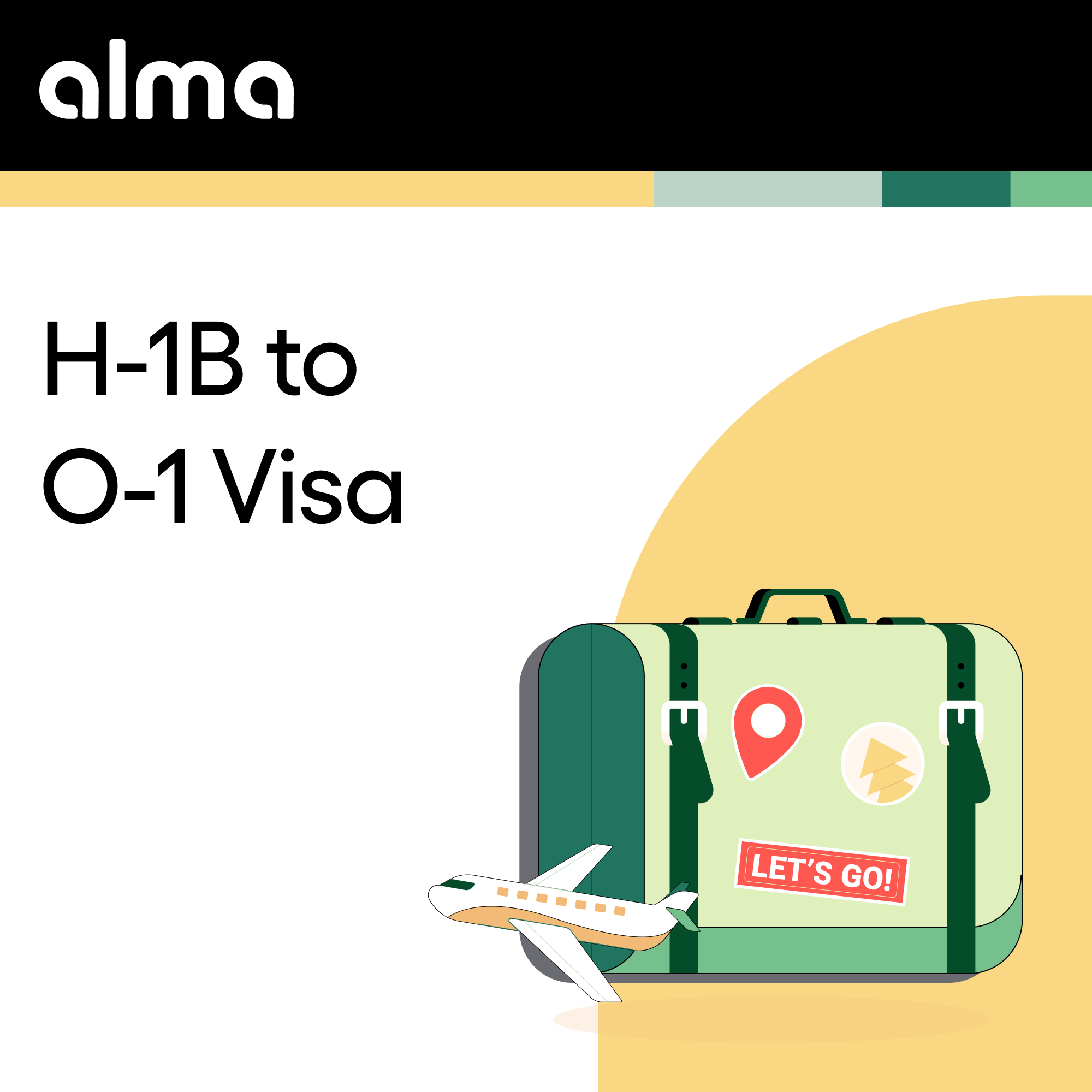- Florida hosts 2.2 million noncitizen immigrants, with 86% of children having at least one immigrant parent
- Florida Bar certification in Immigration and Nationality Law demonstrates specialized expertise
- Family-based I-485 applications take an average of 8.2 months to process, while employment-based timelines vary significantly
- Immigration attorney fees in Florida vary widely depending on case complexity and firm
- Technology-enabled platforms can reduce geographic barriers while offering personalized legal services
Florida's 2.2 million non-citizen immigrants create intense competition for immigration legal services that often leaves clients choosing between overwhelmed traditional firms and impersonal online forms. Whether you're a tech professional in Miami seeking an O-1 visa, an entrepreneur in Tampa pursuing an EB-2 NIW, or a corporation managing multiple foreign nationals across Florida's diverse economy, finding immigration representation that combines genuine expertise with modern efficiency shouldn't require settling for outdated service models.
1. Alma - Technology-Enabled Immigration Platform (Nationwide Service)
While Florida's traditional law firms struggle with initial consultation fees of $40-250 for just 20-60 minutes, Alma transforms immigration legal services through a comprehensive platform that delivers free consultations alongside industry-leading approval rates. Serving Florida residents from Jacksonville to Key West, Alma exclusively focuses on employment-based immigration, achieving a 99%+ approval rate through personalized case management that traditional firms simply cannot match.
What Sets Alma Apart:
Alma's revolutionary approach eliminates the inefficiencies plaguing Florida's immigration landscape. Unlike firms requiring quarterly office visits across Florida's sprawling geography, Alma provides attorney consultations through their secure platform while maintaining transparent, flat-rate pricing. The proprietary workflow system guides clients through complex applications with 2-week document processing turnarounds—significantly faster than many traditional Florida practitioners.
Florida's technology and healthcare professionals particularly benefit from Alma's specialization in H-1B specialty visas and EB-1A extraordinary ability petitions. The platform's automated document collection and real-time case tracking eliminate the endless email chains that bog down traditional filings, while dedicated paralegals ensure every petition exceeds USCIS standards from day one.
Treatment Philosophy:
- Transparent flat-fee structure with no hidden costs—O-1 petitions at $8,000, H-1B at $3,500 (as of January 2025)
- 2-week document processing versus traditional lengthy timelines
- Built-in compliance tracking and proactive alerts prevent costly mistakes common in manual systems
- Dedicated account management throughout the entire immigration journey, not just at critical moments
Specialties:
- O-1 extraordinary visas for researchers and entrepreneurs
- L-1 intracompany transfers for multinational executives
- EB-2 NIW self-petitions for STEM professionals
- TN visas for professionals under the USMCA (formerly NAFTA)
Business Solutions:
For Florida's growing companies, Alma's business immigration platform seamlessly manages 5 to 5,000+ cases with scalable workflows no traditional firm can replicate. The system integrates with HRIS platforms like Workday and BambooHR, providing real-time dashboards, compliance tracking, and spend projections that transform immigration from a compliance burden into a strategic advantage.
Cost: Transparent flat fees from $500 (H-1B lottery) to $10,000 (EB-1/EB-2 NIW) as of January 2025; includes platform access, up to 3 free consultation calls between attorney and employees per matter, and comprehensive administrative support
Availability: Serves all Florida residents through secure online platform with cases handled by experienced immigration attorneys
Contact: Begin with a free consultation at tryalma.com or explore comprehensive visa guides tailored to your situation
2. Lighthouse - Miami
Operating from Miami, Lighthouse positions itself as a technology-focused immigration firm specializing in O-1 visas for engineers and tech professionals. Their marketing emphasizes their "fastest immigration solution" for tech workers.
What Makes Them Stand Out:
Lighthouse targets Miami's tech community with specialized O-1A preparation for AI and robotics professionals. Their online platform promises streamlined case management for technology workers, though the depth of attorney involvement versus automated processing remains unclear from available information.
Service Limitations:
- Narrow focus on O-1 visas excludes many immigration needs
- Limited information about attorney credentials or team composition
- Unclear capacity for handling complex RFE responses or appeals
While their tech-forward approach appeals to certain professionals, the limited service range and lack of comprehensive support may leave clients seeking additional representation for broader immigration needs.
3. Kurzban Kurzban Tetzeli & Pratt - Miami
With 30+ years helping immigrants, Miami-based Kurzban Kurzban Tetzeli & Pratt brings substantial litigation experience. Ira Kurzban's authorship of the widely-cited "Kurzban's Immigration Law Sourcebook" adds academic credibility to their practice.
What Makes Them Stand Out:
The firm's federal litigation background and worldwide reach appeal to complex cases requiring court representation. Their investment immigration services serve high-net-worth individuals, while the academic credentials suggest thorough legal knowledge.
Service Reality:
- Litigation focus may overcomplicate straightforward employment petitions
- Premium pricing likely reflects prestigious reputation
- Miami location requires South Florida presence for optimal service
- Large firm structure may mean working with associates rather than partners
While their expertise suits complex litigation matters, routine employment-based petitions may not require such specialized—and expensive—counsel.
4. Revilla Law Firm, P.A. - Miami
Led by former U.S. Prosecutor Antonio G. Revilla III, this Miami firm brings over 30 years of legal experience to deportation defense and employment-based immigration. They advertise free in-person consultations and claim to have successfully represented thousands of clients.
What Makes Them Stand Out:
Revilla's prosecutorial background provides insider knowledge of government decision-making processes. The firm's bilingual English-Spanish services accommodate Florida's Hispanic community, while their stated experience spans the full immigration spectrum.
Practice Limitations:
- Focus on deportation defense may dilute employment petition expertise
- Miami location limits accessibility for Central and North Florida residents
- Traditional office model requires in-person meetings
- No technology platform mentioned for case tracking
The firm's defensive expertise suits those facing removal proceedings, though professionals seeking proactive employment-based petitions may find more specialized options elsewhere.
5. Maney Gordon Zeller, P.A. - Tampa
Headquartered in Tampa with 100+ years combined experience, Maney Gordon Zeller operates as a nationwide immigration firm. Their Tampa base serves Central Florida while maintaining a broader geographic reach.
What Makes Them Stand Out:
The collective experience suggests institutional knowledge, while their nationwide practice indicates scalability. The Tampa headquarters provides an alternative to Miami-centric firms for Central Florida residents.
Service Considerations:
- Broad practice areas may lack specialized expertise
- No specific approval rates or success metrics published
- Traditional service model apparent from website presentation
- Combined experience metric doesn't indicate individual attorney qualifications
While experienced, the firm's generalist approach and traditional model may not align with tech-savvy professionals seeking efficient, specialized services.
6. Salomon Numa Law Office - Tampa
Salomon Numa's practice emphasizes citizenship, deportation defense, and DACA cases. The firm serves clients throughout Florida and nationally.
What Makes Them Stand Out:
Multiple language support and focus on client protection appeal to vulnerable populations. The practice's emphasis on deportation defense and humanitarian cases fills an important community need.
Practice Focus:
- Heavy emphasis on defensive cases rather than employment petitions
- Limited information about business immigration expertise
- Traditional consultation model without technology integration
- No transparent pricing or timeline commitments
This practice appears better suited for humanitarian and defensive matters than employment-based petitions Florida's professional workforce typically requires.
7. Immigration Law Tampa Bay - St. Petersburg
Attorney Steven A. Culbreath has practiced since 2003, earning AV-Rating from Martindale-Hubbell and AILA membership. The St. Petersburg office serves the Tampa Bay region with various immigration services.
What Makes Them Stand Out:
Professional ratings and AILA membership suggest competence, while the St. Petersburg location serves Pinellas County residents. The stated worldwide client base indicates experience with diverse cases.
Evaluation Factors:
- Solo or small practice may limit capacity for complex corporate matters
- Appointment-only model restricts accessibility
- No technology platform or modern conveniences mentioned
- Limited transparency about specific expertise areas
While credentialed, the traditional solo practice model may not provide the resources or efficiency larger cases require.
8. Law Offices of Carla A. Anzaldi - Miami
With bilingual English-Spanish services, Carla Anzaldi's Miami practice handles family and employment immigration. Her Universidad del Salvador law degree and University of Miami LL.M. provide international perspective.
What Makes Them Stand Out:
Multilingual capabilities and international education background serve Florida's diverse immigrant population. The firm advertises affordable rates, suggesting accessibility for budget-conscious clients.
Service Gaps:
- Small practice structure may limit complex case capacity
- No published success rates or specific expertise areas highlighted
- Traditional service model without modern technology integration
- Miami location may not serve state-wide needs effectively
The practice suits those seeking affordable, basic immigration services, though complex employment petitions may exceed its capabilities.
Making the Right Choice for Florida Immigration
When evaluating immigration legal services, Florida residents face unique state-specific challenges that technology-enabled platforms address better than traditional firms:
Geographic Barriers: Florida's 65,758 square miles make office visits burdensome. Modern platforms like Alma eliminate travel requirements while providing superior communication through secure portals, essential when traditional firms spread across Miami, Tampa, and Jacksonville struggle to serve the entire state efficiently.
Limited Specialist Pool: With Florida Bar certification in immigration law being a mark of specialization, finding true expertise proves challenging. Platforms focusing exclusively on employment-based immigration develop deeper knowledge through volume, handling hundreds of similar cases monthly versus traditional firms' mixed caseloads.
Processing Delays: [Family-based I-485 applications averaging 8.2 months] means every efficiency matters. Technology platforms with 2-week turnarounds can potentially save significant time in overall processing.
Cost Uncertainty: Florida attorneys charge varying fees with unpredictable hourly billing. Alma's transparent flat fees from $500 for H-1B lottery to $10,000 for EB-1 petitions eliminate surprises.
The Florida Advantage: Why Technology Matters Now
Florida's immigration landscape creates unique pressures traditional firms cannot address. The state's 2 million noncitizen immigrants generate overwhelming demand, yet traditional practices remain constrained by physical limitations and manual processes.
The state's SB 1718 (2023) creating additional enforcement measures makes accurate, timely legal guidance critical. Technology platforms with built-in compliance tracking prevent devastating mistakes that occur when relying on traditional firms' paper-based systems.
For Florida's significant tech and healthcare sectors, visa delays mean lost talent and revenue. Modern platforms designed for scale handle surging demand without sacrificing quality, maintaining consistent communication through automated updates while traditional firms leave clients waiting weeks for responses.
The diversity of Florida's immigrant population—from Miami's Latin American community to Tampa's tech workers—demands specialized knowledge generalist firms lack. Platforms focusing exclusively on employment immigration develop expertise through repetition, recognizing patterns traditional practitioners miss.
Other Articles
- List of Immigration Lawyers in Georgia
- Lighthouse Alternatives
- Lawfully Alternatives
- 18 Employment-Based Visa Statistics
- 18 Green Card Statistics
- 11 Visa Approval Rate Statistics
- 15 Visa Denial Rate Statistics
- Patrick Collison and their immigration story
- Vlad Tenev and their immigration story
- Satya Nadella and their immigration story
- Sergey Brin and their immigration story
- Parag Agrawal and their immigration story
- 14 Extraordinary Ability Visa Statistics
- 16 O-1 Approval Rate Statistics
- 15 High-Skilled Immigration Statistics
- 19 Visa Petition Statistics
- 12 I-140 Approval Statistics
Frequently Asked Questions
Not necessarily. Immigration law is federal, allowing attorneys licensed anywhere to represent Florida residents before USCIS. Technology platforms like Alma provide comprehensive services regardless of location, often with faster response times than local firms managing heavy caseloads. Their specialized expertise and dedicated case managers eliminate the geographic limitations plaguing traditional practices.
After completing online consultations, attorneys develop personalized strategies delivered through secure platforms accessible 24/7. Unlike traditional firms requiring office visits for every document, platforms enable instant uploads, real-time tracking, and free calls. Florida's mobile population particularly benefits from handling immigration matters remotely, avoiding traffic and office wait times.
Family-based I-485 applications average 8.2 months, while employment-based timelines vary by category. Attorney preparation adds significantly to total time—traditional Florida firms may take weeks for case preparation, while platforms like Alma offer 2-week turnarounds, potentially reducing overall timelines.
While immigration remains federal, Florida's SB 1718 (2023) creates additional complexities. Alma's platform helps navigate federal requirements while advising on state-level compliance issues affecting visa holders. Their attorneys understand how Florida's enforcement environment impacts federal applications.
Florida immigration attorneys' fees vary widely depending on complexity. Some firms charge $40-250 for consultations. Alma's flat-fee structure provides cost certainty—$3,500 for H-1B, $8,000 for O-1, $10,000 for EB-1/EB-2 NIW.
.png)


.png)
.png)



